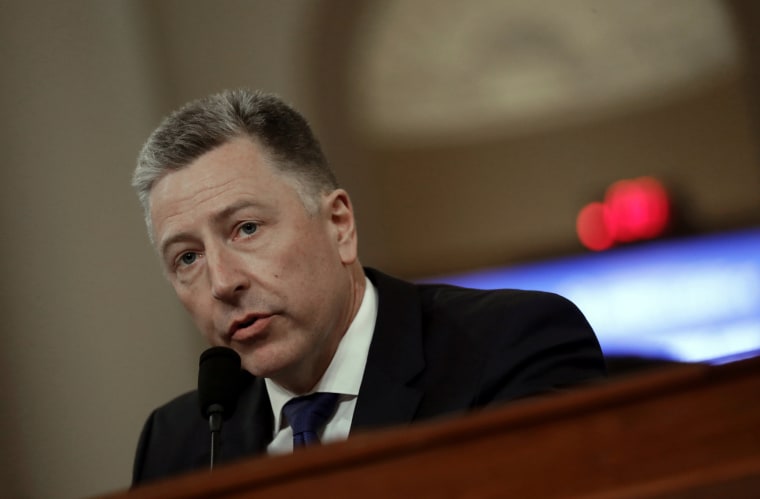WASHINGTON — Kurt Volker, the former U.S. envoy for Ukraine negotiations, told Congress on Tuesday he now sees that others in the Trump administration sought an investigation into the Biden family and that they told Ukraine's government that military aid depended on it — a shift in his account that he said reflected new information he'd only recently learned.
Volker, who was the first witness to be deposed behind closed doors last month in the impeachment inquiry, told the House at the time that "official representatives" of the U.S. had “never communicated to Ukrainians" that the aid had been suspended for a specific reason. He added, "We never had a reason."
But in the weeks since, multiple other officials have testified that the ambassador to the E.U., Gordon Sondland, had, in fact, told a top Ukrainian presidential aide that the country would not likely get the money unless the investigations were announced, a fact Sondland himself ultimately conceded.
"I have learned many things that I did not know at the time of the events in question," Volker said on Tuesday in his new account to Congress, which took place during the open, televised portion of the House Intelligence Committee's impeachment proceedings.
Volker did not sway from his original assertion that he did not know at the time that the aid was frozen as leverage to get Ukraine to announce an investigation of the Bidens. He said he had personally told the Ukrainians "the opposite — that they should not be alarmed, it was an internal U.S. problem, and we were working to get it fixed."
"I did not know others were conveying a different message to them around that same time," Volker said, in an apparent reference to Sondland.
Echoing his previous testimony, Volker maintained that "at no time" did he know of or participate in an effort "to urge Ukraine to investigate former Vice President Biden." Yet he backed away from his previous insistence that he had no reason to think that the interest of President Donald Trump and his personal lawyer Rudy Giuliani in Burisma had to do with Biden, a potential 2020 opponent of the president.
Burisma Holdings is the Ukrainian natural gas company linked to Biden's son Hunter that Giuliani and Trump wanted investigated by the Ukrainians. But Volker said he "saw them as very different — the former being appropriate and unremarkable, the latter being unacceptable" — meaning investigating possible corruption at Burisma would have been OK, but probing the Bidens would not have been.
"In hindsight, I now understand that others saw the idea of investigating possible corruption involving the Ukrainian company Burisma as equivalent to investigating former Vice President Biden," Volker said, adding, "In retrospect, I should have seen that connection differently, and had I done so, I would have raised my own objections" to any investigation of the Bidens.
Volker becomes the third witness to provide additional information hearing beyond what they testified to in their closed-door depositions.
Sondland had initially told lawmakers he didn't know why aid to Ukraine was suspended. But then, following conflicting testimony from others, he acknowledged he'd told a top Ukrainian presidential aide that the money likely wouldn't flow unless they announced the investigations.
Sondland said others' testimony had refreshed his recollection. Still, he argued he had come to the conclusion the aid was tied to the investigations on his own and was never explicitly told so by Trump.
And Bill Taylor, the top U.S. diplomat in Ukraine, testified that in between his private deposition and his public hearing, he'd been informed about a phone call that one of his staffers in Ukraine, David Holmes, had overheard. Holmes had been with Sondland at a restaurant in Kyiv on July 26 while Sondland and Volker were visiting Ukraine.
Holmes later testified about that incident in a closed-door deposition in which he said he'd heard Trump ask Sondland about the investigations and Sondland reassure the president that the Ukrainians were ready to commit to investigations into the Bidens and the 2016 election. That phone call took place just after Sondland had met one-on-one with the top aide to Ukrainian President Volodymyr Zelenskiy, according to Holmes' testimony.
Yet Volker said Tuesday he was unaware of Trump's call with Sondland. Volker was in a different part of Ukraine when that incident took place.
Volker stuck by his previous assertion that he doesn't believe the Ukrainians were aware that the aid had even been frozen until Aug. 29, when it was reported in the U.S. media. Republicans have previously seized on those comments and on the timeline to argue there could not have been a quid pro quo if the Ukrainians didn't even know the aid had been suspended at the time that U.S. officials were pushing for investigations.
Still, other witnesses — including Holmes — have testified that the Ukrainians likely did learn earlier than Aug. 29 that the aid had been frozen.
Volker's reputation has come under attack since his involvement in pushing Ukraine to announce investigations has come to light. As he sought to defend his decision to connect Giuliani to the Ukrainian presidential office, Volker cast himself as working to advance U.S. foreign policy interests regarding Ukraine despite a dearth of good options.
"I found myself faced with a choice: to be aware of a problem and to ignore it, or to accept that it was my responsibility to try to fix it," Volker said. "I tried to fix it."

